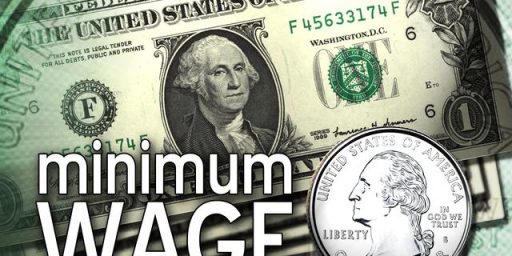MINIMUM WAGE
Nathan Newman and Kevin Drum are praising Howard Dean’s proposal to raise the minimum wage to $7 an hour. Says Kevin,
And for those who insist that raising the minimum wage would cause massive economic dislocation, I’d like to point out that Congress doubled the minimum wage in 1950 with no ill effects, and raised it to about $8/hour in present-day terms in 1968, again with no ill effects. What’s more, with a few exceptions, most minimum wage jobs are in service industries, not manufacturing jobs that are susceptible to being sent overseas. Raising the minimum wage would help a lot of people at a pretty small cost. We should do it.
If it’s true that the government can set wages without measurable affect on jobs, then $7 an hour is awfully meager. Let’s make it $20 or, hell, $100. Why be chintzy? Indeed, at $7 an hour, many people would still be better off on the dole, given the food and medical benefits.
Kevin also renews his push for indexing the minimum wage to congressional salaries at the ten percent level, which he calculates would be $7.50 at present. Aside from market considerations, my initial reaction was that an unskilled laborer wasn’t worth ten percent of what a congressman makes. But it didn’t take me long to come up with a list of congressmen who aren’t even worth $7.50 an hour, so maybe he has a point.






“[B]ut as [Bill] Clinton himself explained two years ago, hiking the minimum [wage] is ‘the wrong way to raise the incomes of low-wage earners.'”
(Time, February 6, 1995, p. 27)
http://www.house.gov/jec/cost-gov/regs/minimum/illusion.htm
Kevin is using the usual Leftist thinking that “money” comes from “businesses” so increasing the minimum wage just increases the cost to business – no big deal.
Ofcourse the higher minimum wage cost is passed onto consumers, so prices would go up at McDonalds or wherever else the minimum wage is employed.
And keep in mind that a lot of other, higher paying jobs, are still somehow pegged to the minimum wage (i.e. minimum wage plus something, especially for union contracts), so the increase ripples through the economy.
Can the economy bear higher prices? Yeah, with a quarterly growth rate of – 8.2%! – and a sustained of probably around 4%, I actually have no problem with a small increase in the minimum wage, but do the analysis from the point of view as a blanket tax on the economy and not just some freebee you can extract from businesses without some drag on the economy.
So, Kevin, the only reason a minimum wage increase would work now is because of what Bush has done with the economy. A minimum wage starts taking back out of the economy what Bush put into it with the cuts.
So if the minimum wage has such a negative effect on the economy, why not abolish it completely? This reductio ad absurdum goes both ways.
sym,
Works for me. Few people are going to be willing to work for less anyway–and why shouldn’t they be able to make that choice?
Kevin is using the usual Leftist thinking that “money” comes from “businesses” so increasing the minimum wage just increases the cost to business – no big deal.
You gotta wonder about people like Kevin and his ilk. They claim they want “jobs” and “living wages” but then they bash business every chance they get. Where the hell do they think jobs come from?
You would think innate self preservation would kick in and show them the folly of their ways but it can’t over come the fantasy and rhetoric.
Kevin is also ignoring the research on this. At best it looks like raising the minimu wage has little or no effect and at worse it does things like increase welfare caseloads, redistributes money amongst low-income households, and reduces fringe benefits. I have a post here that looks at some of the empirical research on this.
“Works for me. Few people are going to be willing to work for less anyway–and why shouldn’t they be able to make that choice?”
I agree, but why stop there. IMHO, the government should be allowed to arrest the unemployed and sell them to corporations. We should also consider bringing back debtors prisons. Better yet, businesses should be able to pay off the debt of individuals. In exchange, the debtor would be forced to work for that business without any pay for 10 years or more. The public schools should also be outlawed and children should be forced to work. These steps would increase productivity and the economy would continue to grow at record rates.
I really think that if you abolish the minimum wage, factories would start hiring people at 3 dollars an hour. I don’t think it would be good for the economy to return to 19th century liberatrianism.
Anyways, I never realized support for the abolition of the minimum wage was such a mainstream conservative position. Why don’t you guys ask Bush to include it in his platform next year? I have a feeling it’s a real electoral winner.
A lot of really bad ideas–liberal and conservative–are popular with the voters. That makes them good politics, not good policy.
Factories can get workers far less than $3 an hour–let alone the federally mandated minimum wage–by going overseas. Now. Presumably, the fact that some of them aren’t doing that has something to do with the type of skills available here.
In many parts of the country, McDonald’s can’t hire fry cooks at minimum wage and have to pay more. In other parts of the country, minimum wage is the best low skilled labor can command. But the market will sort most of that out.
“A lot of really bad ideas–liberal and conservative–are popular with the voters. That makes them good politics, not good policy.”
Good point.
I really believe that abolishing the minimum wage would in fact lead to a big reduction in un/low-skilled workers’ wages. I could be wrong, but I (and the American people, I suspect) would not want to find out.
Besides, it’s inconsistent to argue that the minimum wage level is basically irrelevant to some factories and to McDonald’s “in many parts of the countries”, then say that raising the minimum wage a small amount will have a horrible effect on the economy.
I accept (as does Kevin) there are costs but I think the tradeoff would be worth it.
Minimum wage increases can lead to labor-labor substitution effects or “riptide” effects, causing lower-skilled workers to lose their jobs to higher-skilled, more experienced or more flexible workers (e.g. split-shifters) even when the net change in jobs isn’t negative (and it often is). This just makes the former folks harder to employ, and can contribute to longer labor force separation for them. I won’t go so far as to say it can create a more definite core underclass, but the mechanism is there.
EITC (including state or even local EITC) is a more effective antipoverty tool because it can be statutorily targeted (in other words, it can be specifically enhanced for working families, single mothers, etc., as opposed to the minimum wage’s incidence over suburban teenagers). But it’s a political orphan, for the most part. EITC is preferable to minimum/living wage in almost every conceivable way.
hey im doing a debate if minimum wage should be abolished…and my position is NO and i need some good poins please help
thank you
All of you using arguments to oppose the minimum wage are so full of it, your eyes are brown, and not from genetics.